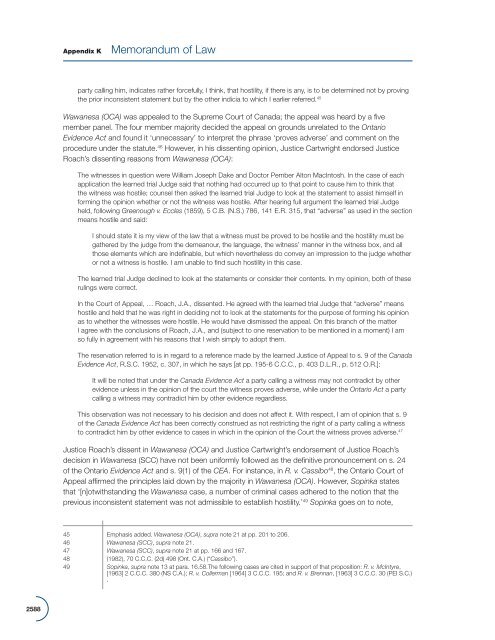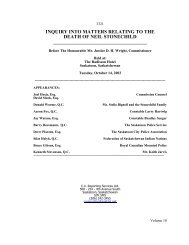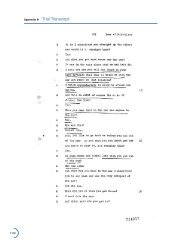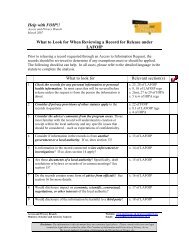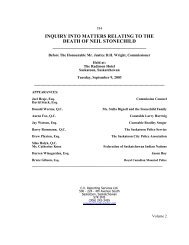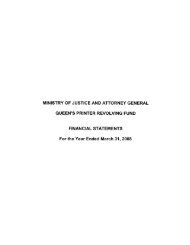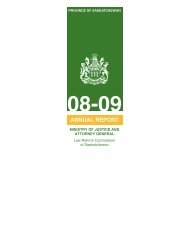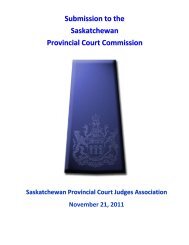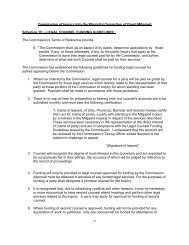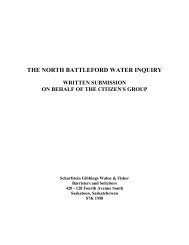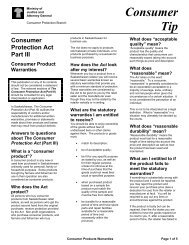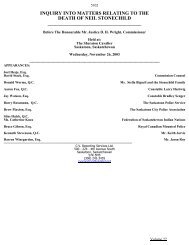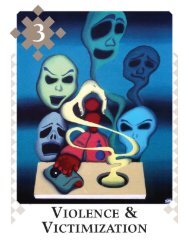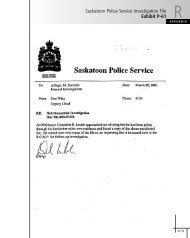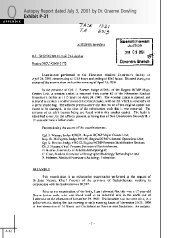Appendix K Memorandum of Law - s. 9(2) of the Canada Evidence Act
Appendix K Memorandum of Law - s. 9(2) of the Canada Evidence Act
Appendix K Memorandum of Law - s. 9(2) of the Canada Evidence Act
Create successful ePaper yourself
Turn your PDF publications into a flip-book with our unique Google optimized e-Paper software.
<strong>Appendix</strong> K <strong>Memorandum</strong> <strong>of</strong> <strong>Law</strong><br />
party calling him, indicates ra<strong>the</strong>r forcefully, I think, that hostility, if <strong>the</strong>re is any, is to be determined not by proving<br />
<strong>the</strong> prior inconsistent statement but by <strong>the</strong> o<strong>the</strong>r indicia to which I earlier referred. 45<br />
Wawanesa (OCA) was appealed to <strong>the</strong> Supreme Court <strong>of</strong> <strong>Canada</strong>; <strong>the</strong> appeal was heard by a five<br />
member panel. The four member majority decided <strong>the</strong> appeal on grounds unrelated to <strong>the</strong> Ontario<br />
<strong>Evidence</strong> <strong>Act</strong> and found it ‘unnecessary’ to interpret <strong>the</strong> phrase ‘proves adverse’ and comment on <strong>the</strong><br />
procedure under <strong>the</strong> statute. 46 However, in his dissenting opinion, Justice Cartwright endorsed Justice<br />
Roach’s dissenting reasons from Wawanesa (OCA):<br />
The witnesses in question were William Joseph Dake and Doctor Pember Alton MacIntosh. In <strong>the</strong> case <strong>of</strong> each<br />
application <strong>the</strong> learned trial Judge said that nothing had occurred up to that point to cause him to think that<br />
<strong>the</strong> witness was hostile; counsel <strong>the</strong>n asked <strong>the</strong> learned trial Judge to look at <strong>the</strong> statement to assist himself in<br />
forming <strong>the</strong> opinion whe<strong>the</strong>r or not <strong>the</strong> witness was hostile. After hearing full argument <strong>the</strong> learned trial Judge<br />
held, following Greenough v. Eccles (1859), 5 C.B. (N.S.) 786, 141 E.R. 315, that “adverse” as used in <strong>the</strong> section<br />
means hostile and said:<br />
I should state it is my view <strong>of</strong> <strong>the</strong> law that a witness must be proved to be hostile and <strong>the</strong> hostility must be<br />
ga<strong>the</strong>red by <strong>the</strong> judge from <strong>the</strong> demeanour, <strong>the</strong> language, <strong>the</strong> witness’ manner in <strong>the</strong> witness box, and all<br />
those elements which are indefinable, but which never<strong>the</strong>less do convey an impression to <strong>the</strong> judge whe<strong>the</strong>r<br />
or not a witness is hostile. I am unable to find such hostility in this case.<br />
The learned trial Judge declined to look at <strong>the</strong> statements or consider <strong>the</strong>ir contents. In my opinion, both <strong>of</strong> <strong>the</strong>se<br />
rulings were correct.<br />
In <strong>the</strong> Court <strong>of</strong> Appeal, … Roach, J.A., dissented. He agreed with <strong>the</strong> learned trial Judge that “adverse” means<br />
hostile and held that he was right in deciding not to look at <strong>the</strong> statements for <strong>the</strong> purpose <strong>of</strong> forming his opinion<br />
as to whe<strong>the</strong>r <strong>the</strong> witnesses were hostile. He would have dismissed <strong>the</strong> appeal. On this branch <strong>of</strong> <strong>the</strong> matter<br />
I agree with <strong>the</strong> conclusions <strong>of</strong> Roach, J.A., and (subject to one reservation to be mentioned in a moment) I am<br />
so fully in agreement with his reasons that I wish simply to adopt <strong>the</strong>m.<br />
The reservation referred to is in regard to a reference made by <strong>the</strong> learned Justice <strong>of</strong> Appeal to s. 9 <strong>of</strong> <strong>the</strong> <strong>Canada</strong><br />
<strong>Evidence</strong> <strong>Act</strong>, R.S.C. 1952, c. 307, in which he says [at pp. 195-6 C.C.C., p. 403 D.L.R., p. 512 O.R.]:<br />
It will be noted that under <strong>the</strong> <strong>Canada</strong> <strong>Evidence</strong> <strong>Act</strong> a party calling a witness may not contradict by o<strong>the</strong>r<br />
evidence unless in <strong>the</strong> opinion <strong>of</strong> <strong>the</strong> court <strong>the</strong> witness proves adverse, while under <strong>the</strong> Ontario <strong>Act</strong> a party<br />
calling a witness may contradict him by o<strong>the</strong>r evidence regardless.<br />
This observation was not necessary to his decision and does not affect it. With respect, I am <strong>of</strong> opinion that s. 9<br />
<strong>of</strong> <strong>the</strong> <strong>Canada</strong> <strong>Evidence</strong> <strong>Act</strong> has been correctly construed as not restricting <strong>the</strong> right <strong>of</strong> a party calling a witness<br />
to contradict him by o<strong>the</strong>r evidence to cases in which in <strong>the</strong> opinion <strong>of</strong> <strong>the</strong> Court <strong>the</strong> witness proves adverse. 47<br />
Justice Roach’s dissent in Wawanesa (OCA) and Justice Cartwright’s endorsement <strong>of</strong> Justice Roach’s<br />
decision in Wawanesa (SCC) have not been uniformly followed as <strong>the</strong> definitive pronouncement on s. 24<br />
<strong>of</strong> <strong>the</strong> Ontario <strong>Evidence</strong> <strong>Act</strong> and s. 9(1) <strong>of</strong> <strong>the</strong> CEA. For instance, in R. v. Cassibo 48 , <strong>the</strong> Ontario Court <strong>of</strong><br />
Appeal affirmed <strong>the</strong> principles laid down by <strong>the</strong> majority in Wawanesa (OCA). However, Sopinka states<br />
that ‘[n]otwithstanding <strong>the</strong> Wawanesa case, a number <strong>of</strong> criminal cases adhered to <strong>the</strong> notion that <strong>the</strong><br />
previous inconsistent statement was not admissible to establish hostility.’ 49 Sopinka goes on to note,<br />
45 Emphasis added. Wawanesa (OCA), supra note 21 at pp. 201 to 206.<br />
46 Wawanesa (SCC), supra note 21.<br />
47 Wawanesa (SCC), supra note 21 at pp. 166 and 167.<br />
48 (1982), 70 C.C.C. (2d) 498 (Ont. C.A.) (“Cassibo”).<br />
49 Sopinka, supra note 13 at para. 16.58.The following cases are cited in support <strong>of</strong> that proposition: R. v. McIntyre,<br />
[1963] 2 C.C.C. 380 (NS C.A.); R. v. Collerman [1964] 3 C.C.C. 195; and R. v. Brennan, [1963] 3 C.C.C. 30 (PEI S.C.)<br />
.<br />
2588


